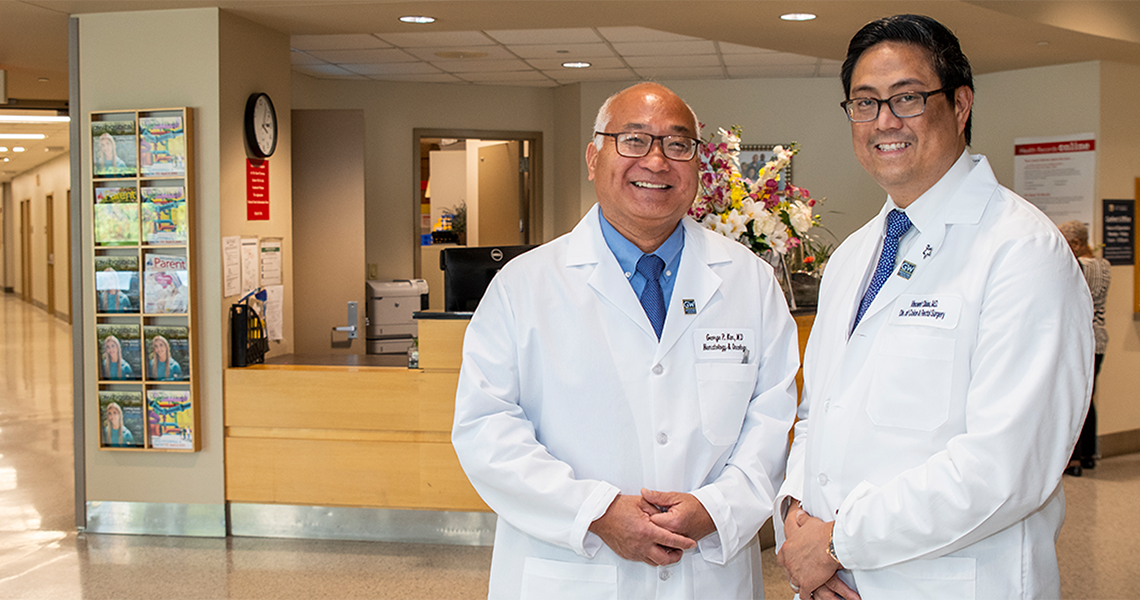WASHINGTON (April 22, 2019) In the last 25 years, significant progress has been made in the fight against cancer. Even still, cancer remains the second most common cause of death in the United States, according to the U.S. Centers for Disease Control and Prevention - and those in the D.C. area are not immune to its burden. In fact, the Washington region has some of the highest rates of liver and colon cancer-related deaths in the country.
A few years ago, the George Washington University (GW) opened a state-of-the-art cancer center on its D.C. campus to advance cancer research, patient care and community outreach. Three of the GW Cancer Center's experts recently stopped by WTOP to discuss their approach to caring for patients and the unique benefits of being treated at an academic medical center.
What patients should look for in a cancer care team:
As a field, cancer care is moving toward model of care that taps into the expertise of surgeons, radiologists, nutritionists, palliative care specialists and other supportive care professionals to help patients through diagnosis, treatment and recovery. Patients should consider asking about available treatment options, such as robotic surgery or access to clinical trials.
The result of a multidisciplinary team-based care concept is a personalized plan and approach for each patient. In fact, research shows coordinated care models can help improve patient outcomes, especially for colon or liver cancer survivors.
At the GW Cancer Center, a team of specialists meets regularly to discuss each case and come up with a plan for care.
"We at the GW Cancer Center understand how life-altering and disruptive being diagnosed with cancer is," said Dr. George Kim, director of the gastrointestinal cancers program at the GW Cancer Center. "So we've amassed a group of specialists to help treat our patients."
Many patients with gastrointestinal cancers face significant side effects or complications from treatment, which is why it's important to select a care team of experts from different specialties working together.
"It's nice to have multiple [experts] in the room so that we can give our patients a wide variety of views, even though we work with them one-on-one," Dr. Vincent Obias, chief of the Division of Colon and Rectal Surgery at the GW Hospital.
The benefits of uniting research, clinical care and education:
Another option patients should consider when seeking cancer diagnosis or treatment is an academic medical center. An academic medical center unites clinical care, research, education and training, while harnessing the resources of an entire university community to make advances against cancer.
New insights in cancer care often come from collaboration by researchers across different fields, such as engineering, biology, public health, medicine and nursing. Physicians and scientists at an academic medical center often lead and consult on clinical trials throughout the country, all while passing down the latest breakthroughs and best practices to patients and the next generation of physicians and specialists.
Dr. Eduardo Sotomayor, director of the GW Cancer Center, explained, "Cancer is a very complex problem, and for those complex problems we need significant resources."
Using the metaphor of cancer as a book, he said most of the current investment in cancer research is in the last chapter of this book, but prevention and early detection are equally critical investments.
Concentrating on cancer burdens in the community:
The D.C. area faces a disproportionate burden when it comes to colon and liver cancer.
"Gastrointestinal cancers in the D.C. and DMV region are very important; we have higher rates than other parts of the country," Kim said. "These are all areas of focus within the GW Cancer Center and hopefully we'll continue to develop important advances."
Recognizing risk factors and taking preventive measures, such as getting screened, can help drive these rates down. Risk factors for colon cancer include age (it's most common in patients over 50), tobacco use and family history. Liver cancer risks include chronic infection with Hepatitis B or C, obesity, diabetes, excessive alcohol consumption and exposure to aflatoxin (a fungus that can grow on foods).
Kim said you can't change genetics and you can't bring your risk to zero, but maintaining an active and healthy lifestyle helps to decrease one's risk for cancer.
"There's plenty of hope. Stay away from tobacco and get screened early. If you find a polyp, have it taken out," Kim said.
Academic medical centers such as the GW Cancer Center are continually working to be responsive to the needs of their communities and the patients they serve.
"Our ultimate goal, if we really want to eradicate cancer, is to properly educate our communities in cancer prevention and control," Sotomayor said.
For more information about the GW Cancer Center, visit gwcancercenter.org or call (833) GW4-CURE to make an appointment.
--
This article is posted courtesy of WTOP. To view the original article, visit wtop.com/health-innovations/2019/04/through-research-treatment-and-education-gw-cancer-center-takes-multidisciplinary-approach-to-cancer-care/.




